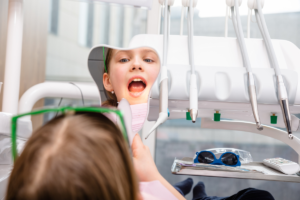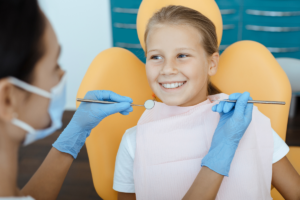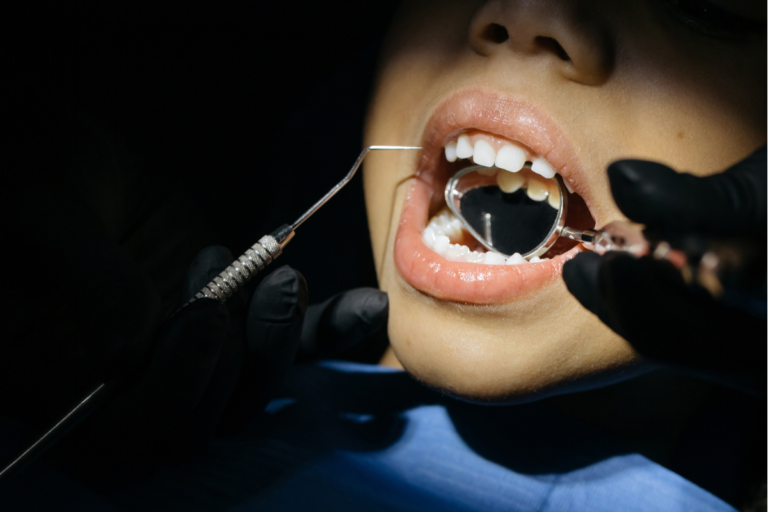Bruxism, commonly known as teeth grinding, is a common issue among children that can lead to dental problems and discomfort. Consulting a pediatric dentist is advisable if your child wakes up with jaw soreness or exhibits signs of teeth grinding.
[toc]
What Is the Significance of Bruxism in Children?
Bruxism in children is characterized by the involuntary grinding or clenching of teeth, typically occurring outside normal chewing activities. It commonly takes place during sleep but can occasionally manifest while they are awake. Children often do not realize when they are experiencing bruxism as it occurs involuntarily.
 What Symptoms Indicate Bruxism?
What Symptoms Indicate Bruxism?
Teeth grinding is a prevalent issue among children, with an estimated 15% to 20% experiencing this habit. Although some parents may hear their children grinding their teeth during sleep, identifying bruxism can pose a challenge because, similar to adults, children are often unaware of this behavior. Watch for the following symptoms and signs that your child may display while grinding or clenching their teeth:
- Frequent headaches and earaches
- Jaw pain or difficulties when chewing
- TMJ disorders may involve jaw clicking and other related problems
- Dental wear and tear or heightened tooth sensitivity
- Subtle mouth movements, such as clenching, while your child is engaged in activities like watching TV, reading, studying, or concentrating on a task
- Audible chattering or grinding sounds during sleep.
What Causes Children to Experience Teeth Grinding?
The precise trigger for teeth grinding in children may only sometimes be wholly comprehended and can differ from case to case. Nevertheless, it is frequently linked to one or a combination of the following factors:
- Discomfort from teething or earaches
- Irregular alignment of the teeth
- Stress, anxiety, or excitement – the most prevalent cause of teeth grinding
- Medical conditions like hyperactivity, cerebral palsy, or specific medications
- Sleep-related problems such as snoring or sleep apnea.
What Treatment Choices Exist for Teeth Grinding?
While not all situations demand immediate intervention, children who engage in teeth grinding may encounter potential long-term repercussions. These could include increased susceptibility to TMJ disorders, jaw issues, migraines, tooth sensitivity, and enamel wear. Treatment strategies should be customized for each specific case and could include:
- Nighttime mouth guards (for individuals who unconsciously grind their teeth during sleep).
- Proactive protective sealants to safeguard tooth enamel.
- Orthodontic braces to rectify alignment issues.
- Therapy or counseling to address underlying stress-related factors.
How Can Parents Aid Their Child in Dealing with Bruxism?
Parents have several strategies at their disposal to assist their child with bruxism:
- Encourage Relaxation: Cultivate a tranquil and soothing atmosphere before bedtime to help reduce stress, a common trigger for teeth clenching. Activities such as taking a warm bath, listening to calming music, or reading a book can promote relaxation.
- Utilize Nighttime Mouthguards: Nighttime mouthguards safeguard teeth from grinding damage during sleep. These devices create a protective barrier, mitigating the impact on teeth.
- Ensure a Cozy Sleep Environment: A comfortable sleeping environment enhances the quality of rest. Ensure your child has a supportive mattress, comfortable pillows, an ideal room temperature, and minimal noise disruptions.
- Foster Excellent Dental Hygiene: Maintaining strong oral hygiene practices is essential for preventing bruxism-related dental issues. Encourage your child to brush teeth, floss diligently regularly, and schedule routine dental checkups.
- Seek Guidance from a Pediatric Dentist: It is recommended to consult a pediatric dentist to assess the severity of bruxism and explore suitable treatment options. They can offer professional advice and suggest personalized strategies for managing bruxism.
If your child reports or exhibits symptoms of teeth clenching or grinding, it is crucial to have a conversation with a pediatric dentist. Although bruxism can pose challenges, effective treatment and care can positively impact your child’s oral health and overall well-being, ensuring a joyful and healthy smile.
 Embrace a Preventive Strategy for Children’s Dental Health in Naples, FL
Embrace a Preventive Strategy for Children’s Dental Health in Naples, FL
At Naples Dental Boutique in Naples, FL, our commitment is to offer a convenient and pleasant experience to parents and children needing pediatric dental services. Our warm and welcoming atmosphere and our compassionate team place your child’s oral health at the forefront.
To schedule an appointment at Naples Dental Boutique for a consultation on addressing and preventing teeth clenching or grinding, please don’t hesitate to contact us at (239) 262-1404.


